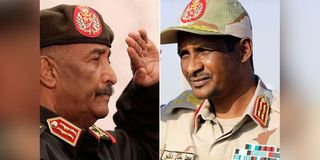Burhan back in Igad fold as he attends summit

Sudan's army chief Abdel Fattah al-Burhan (left) and Rapid Support Forces commander Gen Mohamed Hamdan Daglo 'Hemedti'.
Sudan junta leader Abdel Fattah al-Burhan is attending a summit of the regional bloc Intergovernmental Authority on Development (IGAD) in Djibouti for the first time since his country imploded on April 15, with a conflict that has displaced more than 5.4 million people.
The leaders of the IGAD member states are meeting to review initial strategies meant to end the war, which al-Burhan had initially rejected and threatened to quit the bloc.
But on Saturday, he travelled to Djibouti to gather with leaders or their representatives from IGAD member states including Kenya, South Sudan, Ethiopia, Somalia, Uganda and the hosts Djibouti who are also current Chair of the bloc.
It is a significant turnaround that may also show lessons learnt by both sides. The 42nd Extra-Ordinary Summit has also invited representatives from the UN, African Union and other countries previously involved in the Sudan peace bid. Former Algeria Foreign Minister Ramtane Lamamra, now Personal Envoy for the UN Secretary-General, and Mike Hammer, the US Horn of Africa Special Envoy are among the guests in attendance.
The leaders hope to unify their peace bids on Sudan, which has been in conflict since April when the Sudan Armed Forces led by Burhan clashed with the Rapid Support Forces after a disagreement on a transitional plan.
“Our region stands at a critical juncture, with the ongoing conflict in Sudan casting a shadow over our aspirations of a peaceful and prosperous Horn of Africa,” said Dr Workneh Gebeyehu, IGAD Executive Secretary in an opening speech.
“It is our moral duty to expedite implementation of the partial resolutions of the Jeddah agreement which has been co-facilitated by IGAD … and our partners,” he said referring to recent peace bids led by Saudi Arabia, the US and IGAD in Jeddah, which saw parties agree on opening humanitarian corridors but didn’t follow through.
Now Burhan has lobbied countries in the Horn to see him as the legitimate leader of Sudan. The Summit came on the back of recent shuttle diplomacy trips to Kenya, Ethiopia, Djibouti and Eritrea, besides Sudan itself being directly involved in preparing for the Summit and the agenda.
UN Security Council
The new move involves what is known as the Expanded Mechanism on the Crisis in Sudan, an African Union-led platform that includes Sudan’s neighbours in Africa and the Gulf as well as the European Union, League of Arab States, the US, Russia, China, France and Norway. It also includes Ghana, Mozambique and Gabon, the three African countries currently sitting on the UN Security Council.
On December 4, the Mechanism agreed that the warring parties, Rapid Support Forces and the Sudan Armed Forces must halt the fighting but said the ultimate peace solution could only come from everyone participating at the table.
“Only an inclusive, representative, Sudanese-owned and Sudanese-led dialogue among all Sudanese stakeholders…can lead to a peaceful and sustainable solution to the crisis,” the Mechanism said in a statement after the meeting. They listed the warring parties, other armed movements, political parties, civil society organisations, women and youth groups, resistance committees, labour unions and professional associations, traditional leaders, and academics as crucial for long-term peace.
Western countries like the US, however, are also pushing for specified efforts to ensure justice for the victims of the war, which include killings, rape and other atrocities.
On Thursday, US Secretary of State Antony Blinken declared Sudan a scene of crimes against humanity, war crimes and ethnic cleansing; finally agreeing with assessments by rights groups such as Human Rights Watch and Amnesty International.
“Based on the State Department’s careful analysis of the law and available facts, I have determined that members of the SAF and the RSF have committed war crimes in Sudan. I have also determined that members of the RSF and allied militias have committed crimes against humanity and ethnic cleansing,” he said.
“This determination provides force and renewed urgency to African and international efforts to end the violence, address the humanitarian and human rights crisis, and work towards meaningful justice for victims and the affected communities that end decades of impunity.”
President Ismail Guelleh of Djibouti, William Ruto of Kenya, Somalia’s Hassan Sheikh Mohamud, Ethiopian Prime Minister Abiy Ahmed, South Sudan Foreign Minister James Morgan, Ugandan Minister for Defence and Veteran Affairs Vincent Ssempija, African Union Commission boss Moussa Faki Mahamat and Workneh Gebeyehu, Executive Secretary for IGAD are also attending. Others include the Saudi Ambassador to Djibouti Faisal bin Sultan al-Qabbani and the EU ambassador to Djibouti Sylvie Tadesse.





